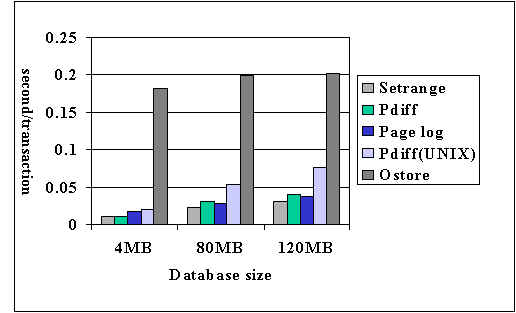

The RVM benchmark is a program developed by the authors of RVM [rvm]. Each transaction reads and updates three 128-byte blocks and appends one 64-byte block to the end of the database. One 128-byte block is chosen randomly from the entire database; the other two 128-byte blocks are chosen from a narrow region. Thus, this benchmark measures the performance of small transactions.
We varied the database's size, ran 4000 transactions for each size, and calculated the mean time needed to complete one transaction. The number of bytes modified by each transaction does not depend on the database size. However, transactions running on small databases can utilize buffers more efficiently when many transactions are run successively.
Figure 6 shows the results. For small databases, setrange and page diffing perform almost equally well. However, as the database's size grows, the performance of page diffing drops quickly: the page diffing algorithm can utilize only half the amount of main memory available to the other schemes, since all the bytes accessed are modified in this benchmark. Page grain logging does a little worse than setrange for all database sizes because of increased logging activities. The UNIX page diffing version consistently performs about 1.5 to 2 times more slowly than SPIN's page diffing. This difference is due to increased user-kernel crossings and extra data copying during I/O, because buffer pages are in ordinary virtual memory. ObjectStore fares badly in this benchmark. Since it performs page grain logging, whole page contents must be communicated to the server via IPC. Thus, it is not suited to small transactions.
